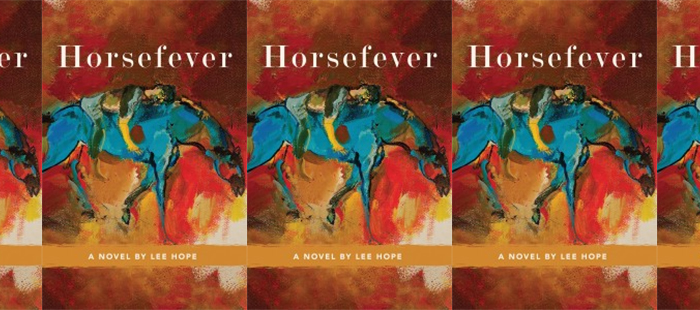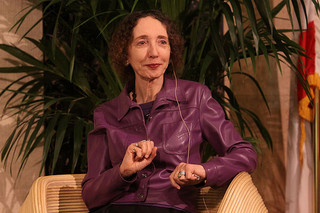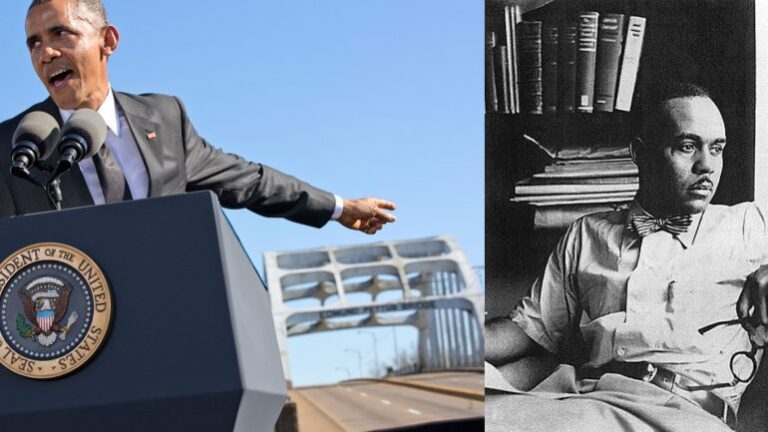Review: HORSEFEVER by Lee Hope

Horsefever
Lee Hope
New Rivers Press, 2016
338pp; $17
Buy: paperback
Reviewed by DeWitt Henry
D.H. Lawrence links horse riding with sexual relationships (and perhaps marriage) when he describes the industrialist, Gerald Crich, fighting to subdue an Arabian mare at a railway crossing where a train is passing: “…he leaned forward, his face shining with fixed amusement, and at least he brought her down, sank her down, and was bearing her back to mark. But as strong as the pressure of his compulsion was the repulsion of her utter terror, throwing her back away from the railway, so that she spun round and round on two legs, as if she were in the centre of some whirlwind” (Women in Love, “Coal Dust”). Lee Hope, in her richly imagined and ambitious novel, Horsefever, explores a similar dynamic both between rider and horse and between women and men, but she goes beyond Lawrence to explore riding as a metaphor for the challenge and art of story-telling. Her story-in-progress itself becomes the author’s mount, as it were, a mount with a will and spirit of its own.
Nikole, the 40-year-old wealthy wife of Cliff, a 50-year-old wealthy marketer, has promise as a rider in equestrian events. Their two children are grown. Horses are her passion rather than his, and her ambition divides them. Nevertheless Cliff indulges her. They own a Vermont horse farm and three horses, and in an act of mixed generosity and condescension, Cliff hires a new trainer for her. Gabe, the trainer, serves as a mentor/tormenter with credentialed mastery, although a fall has crippled him and ended his career as a competitive rider. Advocating riding as a mystery, he resembles mentors in writing and other arts (as well as coaches in most sports) as they discover talented apprentices. The risks of serious riding, he tells Nikole, are physical life and death, but also psychological and spiritual. He gives Nikole exercises, working to overcome her fears and self-doubts. He wants her to devote herself completely to her talent, regardless of Cliff’s needs or her marriage. He wants to take her from Intermediate to Advanced “eventing” and to win—the equivalent of getting published. Both are “addicted” to this quest. “I’ve got no patience with dilettantes,” Gabe tells her.
Clearing jumps on horseback resembles what Hemingway called grace under pressure. Nikole lusts for “transcendence”: “She believes they’re blessed, believes God might just be present, or some holy spirit is.” And again:
“She yearned to let loose, take jumps again, her old youthful desire flowing back, that craving for liftoff, suspension, flight, like two bodies in one, like she sometimes feels making love with Cliff, losing herself. And she has a self she wants to lose, contradictory, often at odds with itself, like now, wanting horses and wanting Cliff.”
The novel dramatizes the growth of jealousy in each of the four main characters except for Nikole. Cliff grows increasingly jealous of Gabe, and vice versa. And Gabe’s wife, Carla grows jealous of Nikole. The bond between Nikole and Gabe remains “innocent” and professional, but finally does cross into momentary adultery, where mixed motives are revealed, and the novel moves to its inevitable climax and inspired conclusion.
The author herself, besides being an equestrian, is a teacher, editor and critic, the founder of Solstice magazine, and inspires and trains writers, including those in prison programs.
Her novel offers psychological insight, subtle dialogue and description, and a high standard of realism in a range of matters beyond those dealing with horses. Her horse expertise, of course, is as intimate as fishing in Hemingway. She is particularly skilled in evoking the four characters’ voices, differentiated not only by gender, but by attitudes, imaginations, and values. The story is told in chapters featuring each point of view. As Gabe puts it: “you go beyond ribbons, you jump into the dark, beyond attachments and craving, into sheer presence.” Novel and novelist clear the bar.
DeWitt Henry won the Peter Taylor Prize for the Novel with THE MARRIAGE OF ANNA MAYE POTTS. His most recent collection is FALLING: SIX STORIES. His memoirs include SWEET DREAMS and SAFE SUICIDE. He is Professor Emeritus at Emerson College and was the founding editor of Ploughshares.


